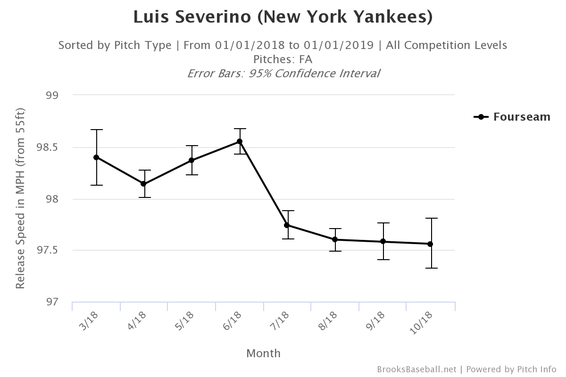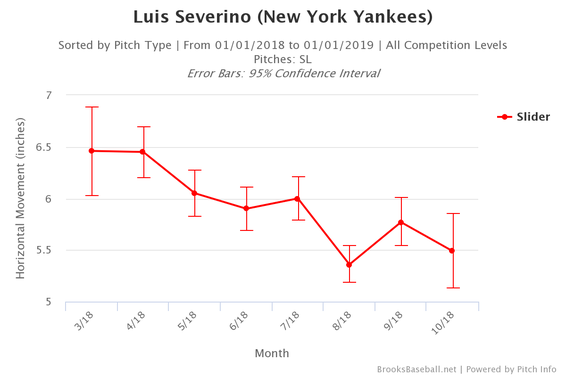Friday afternoon, one day before the Red Sox and Astros open the ALCS at Fenway Park, Yankees manager Aaron Boone and general manager Brian Cashman will hold their annual end-of-season press conferences at Yankee Stadium. New York won 100 games this year, but a four-game ouster in the ALDS qualifies as a disappointing season.
Among the topics Boone and Cashman will surely be asked about: Luis Severino. The staff ace finished the regular season with a 3.39 ERA (129 ERA+) in 191 1/3 innings, which is obviously very good, though it was a tale of two halves for Severino. He was great before the All-Star break and terrible thereafter.
| IP | ERA | WHIP | BB/9 | K/9 | HR/9 | Opp. OPS+ | |
|---|---|---|---|---|---|---|---|
First half | 128 1/3 | 2.31 | 1.01 | 2.2 | 10.1 | 0.7 | 60 |
Second half | 63 | 5.57 | 1.43 | 2.0 | 10.9 | 1.3 | 123 |
Severino was one of the best pitchers in baseball in the first half and one of the worst pitchers in baseball in the second half. The strikeout and walk rates held steady, so that's good, but home runs shot up and Severino was more hittable in general. Severino's fade is a big reason why the Yankees settled for a wild card spot rather than push the BoSox for the AL East title.
In the postseason Severino was knocked around for six runs in seven innings during his two starts, and, even during his four scoreless innings in the Wild Card Game, the Athletics made him work awfully hard. There were a lot of long counts, which led to a season-high-tying four walks. Getting through four scoreless innings was more about the A's being unable to capitalize than Severino pitching well.
The Red Sox did a number on Severino in Game 3 of the ALDS earlier this week, partly because Boone left him in too long, but mostly because Severino was throwing batting practice. Boston clobbered him for six runs in three innings plus three batters. During the game the TBS broadcast appeared to catch Red Sox players calling Severino's pitches from the dugout:
.@LouMerloni just nailed it. Red Sox had a beat on what was coming as early as the second inning. JBJ says "Fastball..." to Mookie before an 0-2 pitch to Holt, Severino pumps in 98 MPH fastball that Holt fouls away. pic.twitter.com/wLGR5dVDys
— Dan O'Mara (@Dan_OMara) October 9, 2018
One short clip is not evidence Severino was tipping his pitches -- players call pitches in the dugout all the time, all year long -- but, during his rough second half, there was chatter Severino was tipping.
Jon Heyman of Fancred.com now reports some Yankees officials are convinced Severino was tipping his pitches in ALDS Game 3. From Heyman:
"The Red Sox had his pitches," one Yankees person says, flat out.
Red Sox broadcaster Lou Merloni pointed out that he noticed there was a tipping issue, and it appeared Red Sox hitters were able to lay off Severino's biting slider consistently. At one point, NESN noted that Jackie Bradley Jr. mouthed "fastball" on the bench to Mookie Betts on an 0-and-2 pitch to Brock Holt.
By the end, Severino appeared to go away from his slider entirely, so he may have suspected as much. Severino lasted only four batters (and no outs) into the fourth, and many suggested he shouldn't have been out there even that long, in the 16-1 Yankees defeat. Yankees people say they heard the "chatter" from Red Sox people about pitch tipping, and they all seem to believe there was something to it.
Severino threw 15 sliders in ALDS Game 3 and the Red Sox swung at six, or 40 percent. Hitters swung at his slider 47.2 percent of the time during the regular season. It was 47.7 percent in the first half and 46.4 percent in the second half. For all intents and purposes, hitters swung at Severino's slider at the same rate all season.
The Red Sox swung at Severino's slider less often in ALDS Game 3 than hitters did during the regular season, but gosh, this sure seems like small-sample-size noise more than anything. One more swing against the slider in ALDS Game 3 gets the Red Sox to a 46.7 percent swing rate, which is right in line with Severino's season average.
It is entirely possible Severino was tipping his pitches during Game 3 of the ALDS and throughout the second half of the season. That would be a convenient excuse for his poor finish. Almost too convenient, really, since there are other troubling signs related to Severino's performance. For example, his fastball velocity:

Context is needed here. Severino's fastball averaged 98.3 mph before the All-Star break and 97.6 mph thereafter. That 97.6 mph average fastball velocity still would've been the highest average fastball velocity among starting pitchers in baseball this season. Severino led MLB at 97.9 mph overall. Gerrit Cole was second at 97.0 mph.
That said, Severino did see his fastball dip 0.7 mph in the second half, which is rather significant for an in-season velocity drop. Every pitcher loses velocity over time. But that kind of dip within one season? Hmmm. That's a red flag.
Furthermore, Severino's slider lost some horizontal movement as the season progressed. When he's right, his slider is a nasty put-away pitch that darts away from right-handed batters. That side-to-side movement wasn't quite there -- or there as much -- in the second half.

In addition to the reduced fastball velocity and slider horizontal movement, Severino's command also appeared to suffer in the second half, though there's no way to quantify that. (Walk rate is a control state. Control is the ability to throw strikes. Command is the ability to quality strikes at the corners, at the knees, etc.) He missed out over the plate too often.
On top of all that, Severino may have been tipping his pitches. And again, it is entirely possible he was tipping his pitches, both in the second half and during ALDS Game 3. But there appears to be more going on here than simply pitch-tipping. Tipping pitches wouldn't explain velocity and movement loss, or subpar command. It seems the Yankees and Severino have more to work on here than a tell.
While injury is always a possibility, keep in mind Severino does not turn 25 until February, and he's thrown over 400 innings the last two seasons, many of them intense innings in a postseason race. The young man may have just hit a wall and needs an offseason to reboot. Severino wouldn't be the first young pitcher to struggle a bit after throwing a ton of innings early in his career. Cole Hamels (4.32 ERA in 2009) and Justin Verlander (4.84 ERA in 2008) went through something similar in their mid-20s.
Whenever a really good pitcher struggles for an extended period of time, the first thought seems to be that he's tipping his pitches. It's become a common excuse and almost something of a crutch. In Severino's case, he may have been tipping his pitches in ALDS Game 3. Absolutely. But there are some other things going on here that may explain his struggles and go beyond tipping.


















